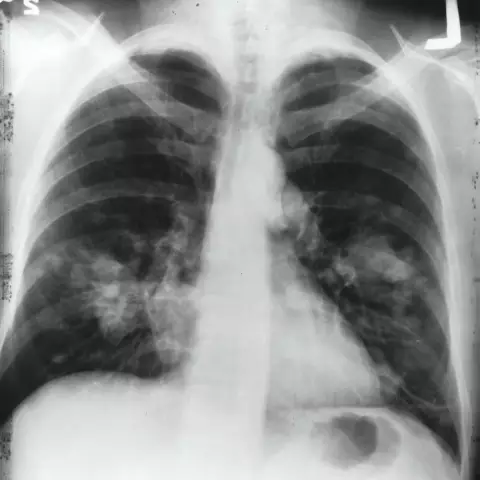- Author Curtis Blomfield blomfield@medicinehelpful.com.
- Public 2023-12-16 20:44.
- Last modified 2025-01-23 17:01.
The gastrointestinal tract is by far the most cancer-prone system in our body. A tumor can develop anywhere in this organ. At the same time, all oncopathologies of the gastrointestinal tract are dangerous and have the same feature: in the early stages, there are practically no signs of the disease.
Symptoms of stomach and pancreas cancer

For example, cancer in the pancreas is often not detected until the stage when it is already difficult to treat (the tumor has grown and started to spread).
Outwardly, the symptoms of cancer are manifested by jaundice in the patient, weight loss, abdominal pain, nausea, and the presence of fat in the stool. If the tumor has blocked the bile duct to the intestine, then the stool loses its brown color and becomes pale, and the urine, on the contrary, darkens.
By the way, in the head of the pancreas, cancer is detected earlier than in oncopathology of other parts of it.
Colon Cancer: Symptoms
Colon cancer(colorectal) is in second place in the country in terms of the number of cases. Like pathologies in other parts of the gastrointestinal tract, colon cancer does not have specific symptoms that belong only to it. Blood in the stool or black stools, persistent constipation or diarrhea, unexplained weight loss, pain in the anus, in the stomach, bloating are not only symptoms of cancer, but also manifestations of other diseases.
Cancer early detection method

Based on the above, one of the most effective methods for the timely diagnosis of oncopathology is a colonoscopy (a complete visual examination of the walls of the large intestine using a probe).
This procedure allows not only to establish the condition of the intestinal mucosa, but also painlessly take, if necessary, during the examination, small tissue fragments for laboratory analysis. If small polyps are found, they can be removed immediately.
If a family has a hereditary tendency to cancer, such an examination should be done by everyone over the age of forty and repeated examinations should be carried out regularly: once every 4-5 years.
What manifestations should alert
In order not to miss the early symptoms of cancer, you need to be attentive to the state of your body. So, frequent changes in bowel function (constipation, diarrhea) and the detection of traces of blood in the feces should alert you and force you to immediately consult a doctor.

At later stages of tumor development in patientsthere is also a feeling of incomplete emptying and heaviness in the intestines. Also, an alarming sign that requires a mandatory visit to a specialist may be pain during defecation, false urges to it, and, of course, pain in the rectum.
When is most likely to develop colorectal cancer
There are risk factors in which the development of cancer is most likely. This is:
- ulcerative colitis (the presence of inflammation and ulcers of the intestine);
- congenital familial polyposis (it causes polyps to form on the lining of the colon);
- Love for fatty foods (regular consumption of foods high in fat but poor in fiber).
Don't wait until the symptoms of cancer are absolutely certain! As a rule, this occurs in the later stages of the disease. Play it safe and stay he althy!






